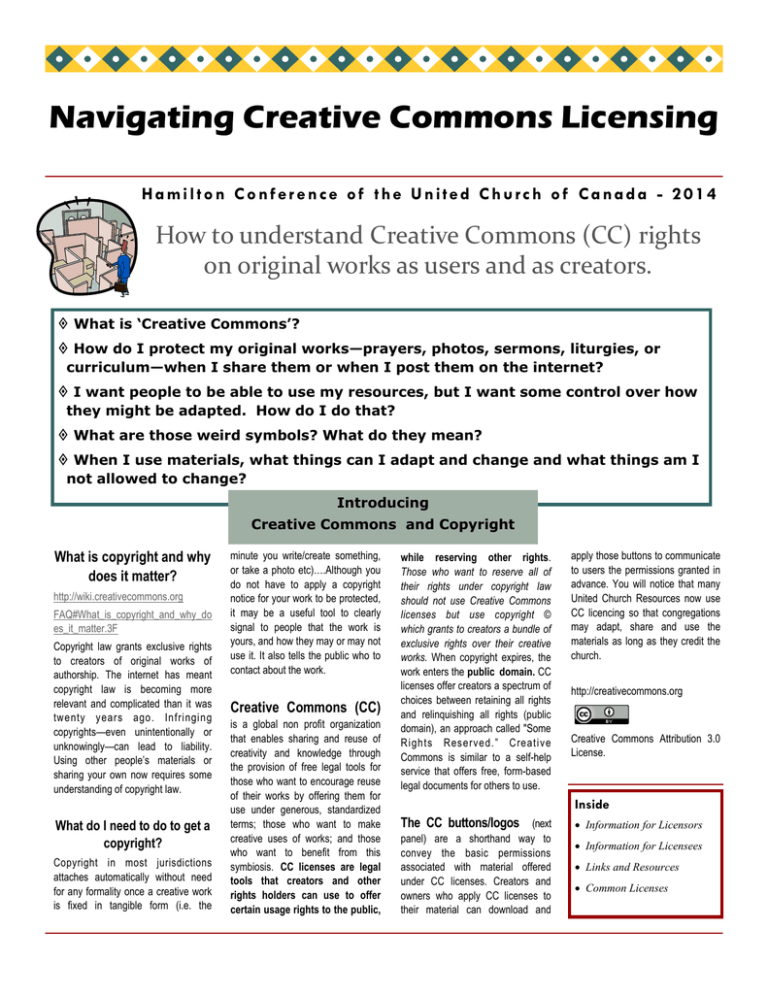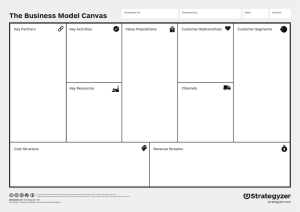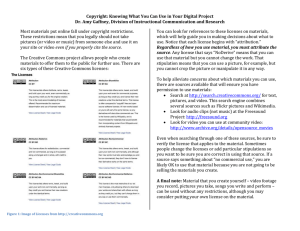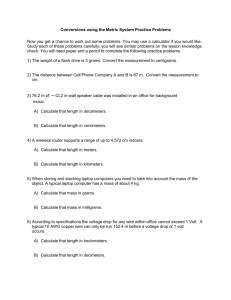
Navigating Creative Commons Licensing
Hamilton Conference of the United Church of Canada - 2014
How to understand Creative Commons (CC) rights
on original works as users and as creators.
What is ‘Creative Commons’?
How do I protect my original works—prayers, photos, sermons, liturgies, or
curriculum—when I share them or when I post them on the internet?
I want people to be able to use my resources, but I want some control over how
they might be adapted. How do I do that?
What are those weird symbols? What do they mean?
When I use materials, what things can I adapt and change and what things am I
not allowed to change?
Introducing
Creative Commons and Copyright
What is copyright and why
does it matter?
http://wiki.creativecommons.org
FAQ#What_is_copyright_and_why_do
es_it_matter.3F
Copyright law grants exclusive rights
to creators of original works of
authorship. The internet has meant
copyright law is becoming more
relevant and complicated than it was
twenty years ago. Infringing
copyrights—even unintentionally or
unknowingly—can lead to liability.
Using other people’s materials or
sharing your own now requires some
understanding of copyright law.
What do I need to do to get a
copyright?
Copyright in most jurisdictions
attaches automatically without need
for any formality once a creative work
is fixed in tangible form (i.e. the
minute you write/create something,
or take a photo etc)….Although you
do not have to apply a copyright
notice for your work to be protected,
it may be a useful tool to clearly
signal to people that the work is
yours, and how they may or may not
use it. It also tells the public who to
contact about the work.
Creative Commons (CC)
is a global non profit organization
that enables sharing and reuse of
creativity and knowledge through
the provision of free legal tools for
those who want to encourage reuse
of their works by offering them for
use under generous, standardized
terms; those who want to make
creative uses of works; and those
who want to benefit from this
symbiosis. CC licenses are legal
tools that creators and other
rights holders can use to offer
certain usage rights to the public,
while reserving other rights.
Those who want to reserve all of
their rights under copyright law
should not use Creative Commons
licenses but use copyright ©
which grants to creators a bundle of
exclusive rights over their creative
works. When copyright expires, the
work enters the public domain. CC
licenses offer creators a spectrum of
choices between retaining all rights
and relinquishing all rights (public
domain), an approach called "Some
Rights Reserved. ” Creative
Commons is similar to a self-help
service that offers free, form-based
legal documents for others to use.
apply those buttons to communicate
to users the permissions granted in
advance. You will notice that many
United Church Resources now use
CC licencing so that congregations
may adapt, share and use the
materials as long as they credit the
church.
http://creativecommons.org
Creative Commons Attribution 3.0
License.
Inside
The CC buttons/logos (next
panel) are a shorthand way to
convey the basic permissions
associated with material offered
under CC licenses. Creators and
owners who apply CC licenses to
their material can download and
Information for Licensors
Information for Licensees
Links and Resources
Common Licenses
Page 2
Navigating Creative Commons Licensing
Creative Commons Basics
There is a core suite of six CC
copyright licenses. It is important
to identify which of the six licenses
you are applying to your material, or
which of the six licenses has been
applied to material that you intend to
use, and in both cases the specific
version.
All licenses require that users provide
attribution (BY) to the creator when
the material is used and shared.
Some licensors choose the BY
license, which requires attribution to
the creator as the only condition to
reuse of the material. The other five
licenses combine BY with one or
more of three additional license
elements:
NonCommercial
(NC),
which prohibits commercial use of the
material; NoDerivatives (ND), which
prohibits the sharing of adaptations of
the material; and ShareAlike (SA),
which requires adaptations of the
material be released under the same
For Licencees -
license.
CC licenses may be applied to any
type of work, including educational
resources, music, photographs, and
many other types of material. CC
does not recommend its licenses for
computer software and hardware.
Also, works in the worldwide public
domain may be marked with the
Public Domain Mark.
Those seeking to use other people’s materials
Before you use CC-licensed Be aware that
material,
creative works sometimes incorporate
Be careful not to imply any
sponsorship,
works owned by others ("third party
content").
Ensure
you
have
permission to use any third party
content contained in the work you
want to use.
endorsement, or connection with the
licensor or attribution party without
their permission.
review the terms of the particular
license to be sure use is permitted. If
you wish to use the work in a manner
that is not permitted by the license,
you should contact the rights holder
(often the creator) to get permission,
or look for an alternative work that is
appropriately licensed. If you use
material in a way that is not permitted
by the applicable license and your
use is not otherwise permitted, the
license is automatically terminated
and you may be liable for copyright
infringement.
.”
opy
c
t to a n
righ otect n of
“
e
r
s th not p ressio er
i
t
t
p
righ t does an ex l mat te,
y
p
Co yrigh ather federa l statu
p
r
a
Co , but it is a feder
a
e
e
id dea… in th ct.
i
an found ight A
r
and Copy
The
If you are looking for Creative
Commons material,
a CC Search may help. Use the
directory
of
organizations
and
individuals who use CC licenses, or
look for a search filter for material
licensed using CC's licenses. Search
results
may
sometimes
be
misleading, so confirm that the
material is actually CC content.
When you are using a work that
is an adaptation
of one or more pre-existing works,
you may need to give credit to the
creator(s) of the pre-existing work(s),
in addition to giving credit to the
creator of the adaptation.
Navigating Creative Commons Licensing
For Licensors-
Page 3
those seeking to protect/share their original work
CC offers resources on the best
Before applying a Creative Scope of the license:
Commons License be aware of The licensor of materials you are practices for marking your material
and on how to mark material in
the following:
using
in
your
work
should
Irrevocability:
Applying a Creative Commons license
to your material is a serious decision.
When you apply a CC license, you
give permission to anyone to use your
material for the full duration of
applicable copyright and similar
rights. Once you apply a CC license
to your material, anyone who receives
it may rely on that license for as long
as the material is protected by
copyright and similar rights, even if
you later stop distributing it.
Type of license:
When determining which of the six
CC licenses to apply, consider what
you hope to achieve by sharing your
work. Consider any obligations that
may affect what type of license you
apply such as licensing requirements
from a funding source or an
employment agreement.
different media.
have marked which elements of the
work are subject to the license and
which are not. For those elements
Cost: There is no cost. CC offers its
that are not subject to the license, you
licenses, code, and tools to the public
may need separate permission.
free of charge, without obligation.
You do not need to register with
Know your obligations to work you Creative Commons to apply a CC
may have used or adapted in your license to your material; it is legally
own creative work, and provide valid as soon as you apply it to any
material you have the legal right to
attribution.
license.
Determine what, if anything, you
can do with adaptations you make
to someone else’s work.
...For further and more detailed
information Choose your media:
Online,
offline and third-party platforms
(YouTube,
etc.)
have
different
methodologies to follow. Read the
directions on the CC site and follow
them carefully. Legally the options
are the same. The difference is in
equipping
online
material
with
metadata
which
enables
CCequipped search engines to find it.
http://wiki.creativecommons.org/Befor
e_Licensing
and
http://wiki.creativecommons.org/FAQ
Links and Resources
Creative Commons. Org
http://creativecommons.org/
Mission, licences,
Case Studies, Global Network
Creative Commons Search Engine
Explore—Look for CC works
http://search.creativecommons.org/
Creative Commons Music Communities
http://creativecommons.org/musiccommunities
Public Domain Tools
http://creativecommons.org/publicdomain/
Creative Commons Music Communities http://creativecommons.org/musiccommunities
Creative Commons Canada
http://creativecommons.ca/about
The affiliate that supports Creative
Commons in Canada. It is a collaborative initiative between
the Samuelson Glushko Canadian
Internet Policy and Public Interest
Clinic (CIPPIC), BC campus, Athabasca University.
Choosing a licence
- Canadian tool:
http://creativecommons.org/choose/
Learn about Creative Commons
with a free online CC course—at
P2PU (a free ‘open’ web University)
https://p2pu.org/en/groups/get-cc-savvy/
Learn OPEN practices at the
School of Open
Open: Universal access to and participation in research, education, and
culture (open access, open source
software, their communities and the
movement)
https://p2pu.org/en/schools/schoolof-open/
Clarifying the maze
of Creative Commons
Licenses
Maze by Gregory Stewart Own work. Licensed under
Public Domain via
Wikimedia Commons
Creative Commons Licenses
Attribution (CC-BY)
This license lets
others distribute,
remix, tweak, and build upon your
work, even commercially, as long as
they credit you for the original
creation. This is the most
accommodating of licenses offered.
Recommended for maximum
dissemination and use of licensed
materials.
Attribution-ShareAlike
(CC BY-SA)
This license lets
others remix,
tweak, and build upon your work even
for commercial purposes, as long as
they credit you and license their new
creations under the identical terms.
This license is often compared to
“copyleft” free and open source
software licenses. All new works
based on yours will carry the same
license, so any derivatives will also
allow commercial use. This is the
license used by Wikipedia, and is
recommended for materials that
would benefit from incorporating
content from Wikipedia and similarly
licensed projects.
Attribution-NoDerivs
(CC BY-ND)
This license
allows for
redistribution,
commercial and non-commercial, as
long as it is passed along unchanged
and in whole, with credit to you.
Attribution-NonCommercial
(CC BY-NC)
This license lets
others remix,
tweak, and build
upon your work non-commercially,
and although their new works must
also acknowledge you and be noncommercial, they don’t have to
license their derivative works on the
same terms.
1552 Highway #6 North,
Hamilton, Ontario
L8N 2Z7
Or by mail
P.O. Box 100, Carlisle, ON
L0R 1H0
905-659-3343
We’re on the
Web
hamconf.org
Attribution-NonCommercialShareAlike
(CC BY-NC-SA)
This license lets
others remix,
tweak, and build
upon your work non-commercially, as
long as they credit you and license
their new creations under the identical
terms.
Attribution-NonCommercialNoDerivs (CC BY-NC-ND)
This license is
the most
restrictive of our six main licenses,
only allowing others to download your
works and share them with others as
long as they credit you, but they can’t
change them in any way or use them
commercially.
Materials in this brochure are from
creativecommons.org
http://creativecommons.org
Creative Commons Attribution 3.0 License.




